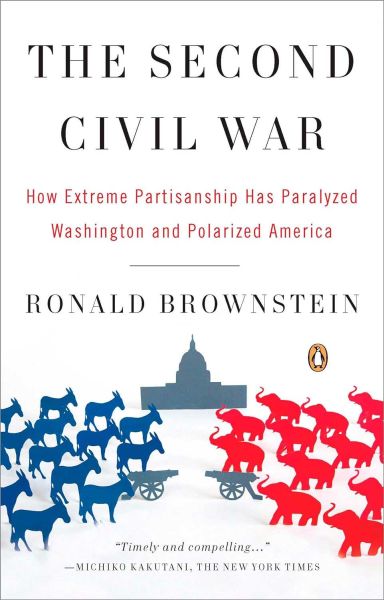Office-Holders
Office-holders
The political journalist Ronald Brownstein has worked for the Los Angeles Times, CNN, and the Atlantic magazine. In his career, he has covered a number of beats: the White House, the national scene, and political strategic planning. He published a well-received book The Second Civil War in 2007.
Just the title should give a person cause to pause. The under-title reads How Extreme Partisanship has Paralyzed Washington and Polarized America. As a liberal Democrat, Brownstein naturally blames the Republicans for the partisanship, but the title Second Civil War suggests that the nation could face serious consequences if it continues. Brownstein uses "partisanship" and "polarization" frequently, always incited by the Republicans.
Political life in America was more polite and bi-partisan during the 1970s, Brownstein recollects, when John Rhodes and Robert Michel served as Republican Congressional leaders. Rhodes served as the Minority Leader in the House of Representatives from 1973-81. Michel served as Minority Leader from 1981-95. Rhodes served a total of 30 years in the House; Michel, 38 years—until the arrival of Georgian Newt Gingrich, who changed everything. Think about it: the Republicans had not had a majority in the House of Represetatives in 55 years!
Brownstein takes a friendly jab at Michel and Rhodes when he says, "The House GOP leadership resembled a sleepy, family-owned company, ripe for a takeover." The two Republicans "minimized their confrontations with Democrats." Both were "self-effacing, mid-century, middle Americans . . . leery of ideas that veered too sharply from the accepted political mainstream."
Then Newt Gingrich arrived and let everyone know right from the start that Republican strategies had changed. The changing of the guard must have left many moderates bitter. "My interest is in creating a positive, dynamic, high-tech, self-governing, free-market future," Gingrich elaborated. In Gingrich's view, "Republicans must sharpen their differences with Democrats." Michel and Rhodes should no longer claim to represent Republican Party values, and both of them stepped aside when Gingrich made his intentions known.
Republican office-holders work hard to get where they are. The prestige conferred on them by the status of Congressman or Senator is a dream-come-true for many of them. They wouldn't trade its aura and authority for anything in the world. That is why, if the police stop them for being drunk behind the wheel of a car, practically the first words out of their mouths is "Don't you know who I am?" They have worked like hell to get where they are, so show 'em a little respect!
Brownstein writes that Gingrich told anyone who would listen that he considered the Bob-Michel plan of cooperation "a formula for permanent subjugation." Brownstein writes that, under Gingrich plan, "Republicans were trading ease and intermittent influence for real power." Gingrich himself added, "We want to delineate what the real choices are."
Brownstein regrets the course that Gingrich took, that led to his "Contract with America," an effort to help Republicans regain leadership positions in the Congress and the Presidency, itself; but he does not hide his respect for Gingrich's boldness and resolve, even with the subsequent increase in partisanship and polarization.
"The Reagan administration challenged the prevailing assumptions of liberalism more forcefully . . . than Nixon's did. . . . In one early 1982 poll, Gallup reported that 83% of Republicans approved of Reagan's performance, compared to just 20% of Democrats—at that point, the widest gap between the parties Gallup had recorded."
Brownstein raises questions and cannot provide satisfactory answers. That does not reflectly badly on him, but on the insoluble questions—whether to adopt the Left's government-centered policies, or the Right's private-sector approach. Then Brownstein said something that every American needs to take to heart: "Eventually one side in this argument may assemble a coalition of public and institutional support sufficient to impose a fundamental change on the other." Not to pay attention to this, Brownstein writes, is like "telling a cancer patient to forgo chemotherapy while waiting for a miracle;" but he never mentions dividing the country, so that both sides can have their way. No one ever does. It is the elephant in the American bedroom.


